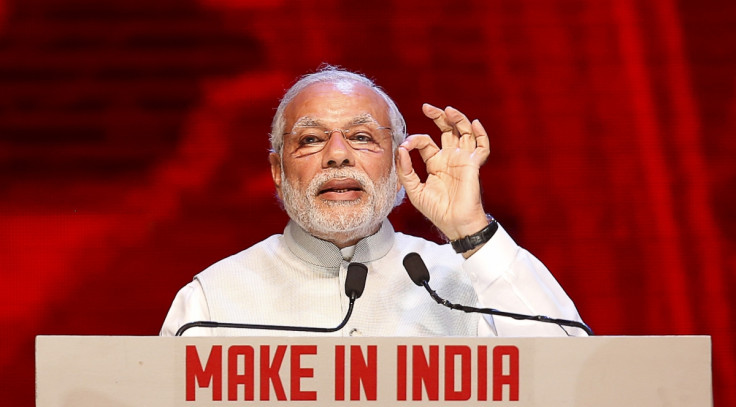World Sufi Forum 2016: What you need to know about Muslim event inaugurated by Narendra Modi

The World Sufi Forum 2016 begins in New Delhi on 17 March, bringing together 200 Sufi leaders and scholars to present their research. Indian Prime Minister Narendra Modi is expected to inaugurate the four-day event dubbed the 'Global Forum for Peace, Tolerance and Unconditional Love'.
The World Sufi Forum is being organised by the All India Ulama and Mashaikh Board (AIUMB) alongside their partner and sister organisations. The Forum was started by Hazrat Syed Mohammad Ashraf, a prominent spiritual master from Kichawchcha Sharif, a famous Sufi shrine in Ambedkar Nagar in the northern state of Uttar Pradesh.
Speaking of the creation of AIUMB, a statement from the World Sufi Forum noted: "It was the first time in Indian history that [Syed] gathered the heads of Indian Sufi shrines, including Ulama, Imams and Muftis and other Muslim leaders in India to build community resilience against violent extremism and terrorism."
Syed believes that in the 21<sup>st century materialism and extremism have "captivated the young" and that Sufis should reach out to the masses to assist with curing this. The World Sufi Forum will host five conferences, peaceful rallies and thousands of meetings in all corners of the country in an attempt to promote peace and encourage state governments to consider the current issues of Indian Muslims.
Looking forward to interacting with spiritual leaders, scholars, academicians, theologists from 20 nations, who have joined World Sufi Forum
— Narendra Modi (@narendramodi) March 17, 2016
IBTimes UK rounds up everything you need to know about the World Sufi Forum 2016.
What is the World Sufi Forum 2016?
The World Sufi Forum attempts to provide a platform for Ulama, Mashaikh, scholars, writers and academics to contribute to the causes of "peace, dialogue, education and knowledge production". Through seminars, conferences, panel discussions and publications, it brings together those interested in fostering peacemaking, countering extremism and participating in interfaith harmony.
A statement from the World Sufi Forum organisers said: "With the World Sufi Forum, Hazrat Syed Ashraf embarked on an ambitious mission: providing a space for enlightening discourses on Sufiism and spirituality in Islam and building a platform for intra and inter-community dialogue on a wide variety of religious, social, cultural and ethical issues."
What is happening over the four-day event?
Day One: 17 March 2016
4pm until 8pm (All times local, GMT -6 hours)
Opening speeches by VIP guests and AIUMB President (Vigyan Bhawan)
Day Two: 18 March 2016
9am until 12.30pm
Inaugural session (BS Abdul Rahman Auditorium)
Preside By: Shaikh Shauqui Ibraheem Abdulkareem Allam (Mufti-Azam, Egypt), Shaikh Hasheemuddin Al-Gilani (Iraq)
Guest of Honor: Honorable Mr. Arvind Kejrival (Chief Minister of Delhi)
Inaugural Speech: Hazrat Syed Mohd Ashraf Kachhuchvi (President: AIUMB)
Honorable Speakers:
Dr. Syed Shah Khusroo Husaini (India)
Sheikh Faisal Hamid Abdul Razaq (Canada)
Syed Asad Ali Shaah Abualai (Pakistan)
Kabir Helminski (America)
Sheykh Hüseyn Muharrem Tayyar el- Rifai (Turkey)
Md. Tolegen Mukhamejanov (Kazakhstan)
Mr. Damir Hazrat Mukhetdinov (Russia)
Dr. Syed Shamimuddin Munami (India)
2.30pm until 5.30pm
The Revivial of Tasawwuf: Suggestions and Solutions (BS Abdul Rahman Auditorium)
Importance of Sufi Teaching: Advantages and Significance (Conference Room 1)
The Role of Sufis to Reconcile the National Harmony and Culture (Conference Room 2)
7pm until 9.45pm
History and Reasons of Terrorism and Extremism (BS Abdul Rahman Auditorium)
Tasawwuf and Sufia: Issues and Discussions (Conference Room 1)
The Role of Tasawwuf and Sufi in the Promotion of Tolerance and Coexistence (Conference Room 2)
Day Three: 19 March 2016
9.30am until 12.30pm
The Role of Sufisto Build up the Unity of Muslims Ummah (BS Abdul Rahman Auditorium)
The Role of Sufis to Restore Ethical Values of Human Society (Conference Room 1)
Tasawwuf: Mission and Movement (Conference Room 2)
2pm until 5.30pm
Tasawwuf in 21<sup>st Century: Seeking to Solve Global Crises – English (BS Abdul Rahman Auditorium)
Islam and the Role of Women as Leaders and Peacemakers (Conference Room 1)
Tasawwuf in 21<sup>st Century: Seeking to Solve Global Crisis – Arabic (Conference Room 2)
7pm until 10pm
Valedictory Session (BS Abdul Rahman Auditorium)
Day Four: 20 March 2016
10am until 2.30pm
Mass Congregation (Ramlila Maidan)
Who is speaking at the event?
International speakers
Allama Shahzad Mujaddidi
Dewan Ahmad Masood Chishti
Dr Alan A Godlas
Dr Sayed Makhdoom Raheen
Dr Walter Andersen
Maulana Hamid Sayeed Kazmi
Tolegen Mukhamejanov
Jonathan Granoff
Mufti Ansarul Qadri
Muhammad Alauddin Siddiqui
Professor David Peck
Muhammad Saqib Bin Iqbal Shami
Professor Carl Ernst
Richard Helminski Edmund
Shah Taj Hussain
Shawki Ibrahim Abdel-Karim Allam
Shaykh Afeefuddin Al-Jailani
Shaykh Allama Ghulam Rabbani
Shaykh Ashraf Mahmood Parker Al-Qaadri
Shaykh Awn Al-Qaddoumi
Shaykh Faisal Hamid Abdul Razaq
Shaykh Hashimuddin Al-Gaylani
Shaykh Mohammad Bin Yahya Al Ninowy
Shaykh Mohammad Idrees Bouchibti
Shaykh Muhammad Imdad Hussain Pirzada
Shaykh Tugrul Jerrahi Effendi-Darwesh
Shaykh-ul-Islam Dr Muhammad Tahir-ul-Qadri
Sheykh Huseyn Muharrem Cafer Tayyar el-Rifai
Stephen Suleyman Schwartz
Sufi Mohamed Minazur Rahman
Utsad Haji Nurooddin
Indian speakers
Dr Qamrul Huda Fareedi
Dr Syed Aleem Ashraf Jaisi
Dr Syed Siraj Ajamli
Hazrat Aby Saeed Ehsanullah Safwi
Hazrat Dr Syed Shah Shamimuddin Munami
Hazrat Maulana Syed Ashraf Kaleem Jaisi
Hazrat Maulana Syed Kazim Pasha Qadri
Hazrat Maulana Syed Sibtain Haider Barkati
Hazrat Mufti Mohd. Mukarram Ahmad Naqshandi
Hazrat Prof. Syed Muhammad Amin Mian
Hazrat Prof. Syed Talha Razvi Barq
Hazrat Shah Mohammad Saqlain Miya
Hazrat Shaikh Abdul Hameed Mohd Salim Qadri
Hazrat Syed Mohammad Ashraf Kichhowchhawi
Hazrat Syed Muhammad Najeeb Haider Barkati
Hazrat Syed Saifuddin Firdausi
Maulana Syed Ruknuddin Asdaq
Mufti Mutiur Rahman Razvi
Mufti Ziyauddin Naqshbandi
Prof Farooq Ahmed Siddiqui
Prof Hussainul Haq Chishti
Prof Akhtarul Wasey
Prof Khwaja Ekramuddin
Prof Masood Anwar Alavi
Prof Mustafa Shareef
Shaikh Abubakr Ahmad
Shaikh Sufi Javed Hussain Hasani
Shaikh Sufi M. Sabahat Hasan Shah
Shaikh Sufi Rashid Raza Asvi
Syed Salman Chishty
Syed Mohammad Mehdi Miyan Chishty
© Copyright IBTimes 2025. All rights reserved.






















